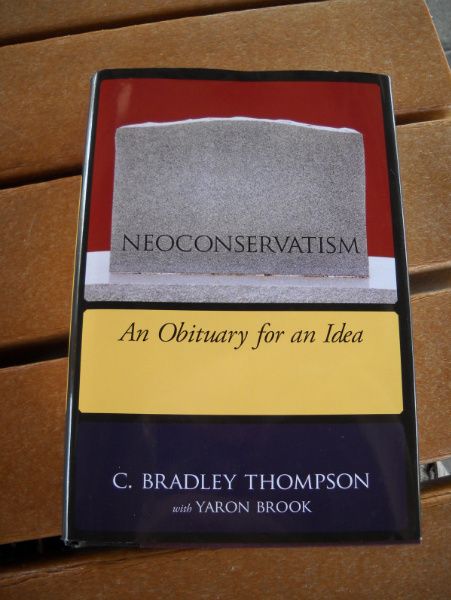I'm about half way through C. Bradley Thompson's new book, Neoconservatism: An Obituary for an Idea. Yeah, it's an attack on neoconservatism, by one who was sympathetic to the ideology at one time. It's an excellent read, although I disagree with its conclusions, and it'll take me some thinking to put those disagreements in more detailed writing here. I can say that Thompson's focus so far is primarily on Irving Kristol and how he was informed by Straussian political philosophy. Hence, Thomspon reads an allegedly extreme authoritarianism into the movement that --- it is argued --- is at odds with the vision of the American founders. I'd simply note that neocons are way more eclectic than is postulated at the book, and again, I'm not done yet. I have peeked ahead to the conclusion, and Thompson takes his thesis to its logical conclusion to find neoconservatism anti-democratic. More on this later. Meanwhile, this is the kind of response I'd offer outside of the Irving Kristol exegesis, from Max Boot:

"Neocons Are Liberals Who Have Been Mugged by Reality"BONUS: At Dr. Sanity, "WHAT THE WORLD NEEDS NOW...":
No longer true. Original neoconservatives such as Irving Kristol, who memorably defined neocons as liberals who'd been "mugged by reality," were (and still are) in favor of welfare benefits, racial equality, and many other liberal tenets. But they were driven rightward by the excesses of the late 1960s and early 1970s, when crime was increasing in the United States, the Soviet Union was gaining ground in the Cold War, and the dominant wing of the Democratic Party was unwilling to get tough on either problem.
A few neocons, like philosopher Sidney Hook or Kristol himself, had once been Marxists or Trotskyites. Most, like former U.N. Ambassador Jeane Kirkpatrick, simply had been hawkish Democrats who became disenchanted with their party as it drifted further left in the 1970s. Many neocons, such as Richard Perle, originally rallied around Henry "Scoop" Jackson, a Democratic senator who led the opposition to the Nixon-Ford policy of détente with the Soviet Union. Following the 1980 election, U.S. President Ronald Reagan became the new standard bearer of the neoconservative cause.
A few neocons, like Perle, still identify themselves as Democrats, and a number of "neoliberals" in the Democratic Party (such as Sen. Joseph Lieberman and former U.N. Ambassador Richard Holbrooke) hold fairly neoconservative views on foreign policy. But most neocons have switched to the Republican Party. On many issues, they are virtually indistinguishable from other conservatives; their main differences are with libertarians, who demonize "big government" and preach an anything-goes morality.
Most younger members of the neoconservative movement, including some descendants of the first generation, such as William Kristol, editor of the Weekly Standard, and Robert Kagan, senior associate at the Carnegie Endowment for International Peace, have never gone through a leftist phase, which makes the "neo" prefix no longer technically accurate. Like "liberal," "conservative," and other ideological labels, "neocon" has morphed away from its original definition. It has now become an all-purpose term of abuse for anyone deemed to be hawkish, which is why many of those so described shun the label. Wolfowitz prefers to call himself a "Scoop Jackson Republican."
...is not love or global orgasms, but more neoconservatism.Cross-posted from American Power.













No comments:
Post a Comment